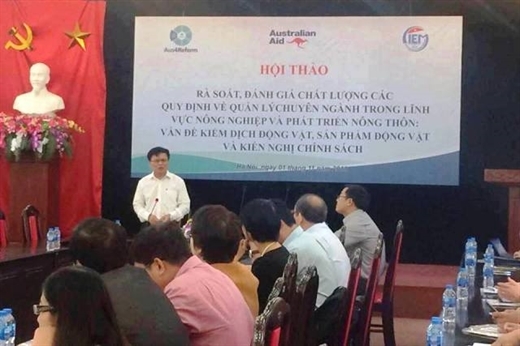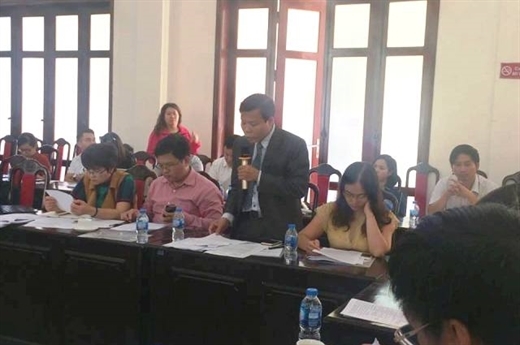Australia supports Economic Reform in Vietnam (Aus4Reform)
- en
- News and Media
- Aus4Reform News
- Current quarantine of animal, animal products affecting the quality of products, wasting money and time for businesses
2/11/2018
Current quarantine of animal, animal products affecting the quality of products, wasting money and time for businesses
“Quarantine time lasts 1-2 weeks, costing millions of working days, wasting hundreds of billion and affecting the quality of products, especially short expiry date items such as yogurt, pasteurized Milk. During the quarantine process, five samples are taken, so the test cost is up to 5 times.”
Current quarantine of animal, animal products affecting the quality of products, wasting money and time for businesses
“Quarantine time lasts 1-2 weeks, costing millions of working days, wasting hundreds of billion and affecting the quality of products, especially short expiry date items such as yogurt, pasteurized Milk. During the quarantine process, five samples are taken, so the test cost is up to 5 times.”
It is the opinion of Representatives of American Chamber of Commerce in Vietnam (Amcham) at the workshop “Review and Evaluate the quality of regulations on business conditions, specialised inspection in the field of agriculture and rural development: the issue of quarantining animal and animal products and policy recommendations” held by the Central Institute for Economic Management (CIEM) on 1 November 2018 within the framework of the Australian Support for Vietnam Economic Reform Program (Aus4reform Program).
 |
| Conference scene |
At the workshop, Representatives from Department of Animal Health (Ministry of Agriculture and Rural Development) introduced 2 Bills: Circular amending some articles of Circular No. 25/2016 / TT-BNNPTNT dated 30 June 2016 on quarantine of animals and products of terrestrial animals and the Circular amending some articles of Circular No. 26/2016 / TT-BNNPTNT dated 30 June 2016 on quarantine of animals and aquatic animal products.
The seminar also discussed issues related to animal and animal quarantine. Since then, seeking solutions and proposals to reform procedures of animal quarantine and animal products to create favorable conditions for enterprises but still meet the requirements of state management.
The current situation shows that quarantine of animal and animal products are still inadequate. Highly processed dairy products that have been fully canned before they are imported into Vietnam comply with the approved standards of the manufacturer. However, they must have specialized inspection procedures in both food hygiene and safety (in the health sector) and animal quarantine (in the agricultural sector). This means that a product has to be double-checked by two ministries, which costs resources and time for the enterprise.
A representative of the European Chamber of Commerce in Vietnam (Eurocham), said that all food products containing animal derived from animals were imported into Vietnam, in spite of having the health certificate of the exporting country, must be 100% quarantined for clearance. With this regulation, due to being heat treated, a cake or a packet of milk coffee containing a few drops of milk or medical nutrition products extremely safe, ingredients contain only a small amount of dairy protein must still be quarantined.
 |
|
Representatives of the European Chamber of Commerce in Vietnam (Eurocham) commented on the inadequacies of animal quarantine. |
100% horizontal inspection is not based on the principle of risk management and international practices, which cause many problems for both state agencies and business community and do not meet the target of Reducing the time / rate of specialized inspection set out in Resolution 19 of the Government in the last 3 years.
In this context, the Bill Circular amending and supplementing some articles of Circular 25 and 26/2016 / TT-BNNPTNT gets positive opinions. According to the Bill Revision of Circular No. 25/2016, there has been progress in risk management when dividing high risk and low risk items into different inspection frequencies, avoiding “horizontal inspection”. However, the high-risk and low-risk categories should be clarified.
Having the same thinking with enterprises, Representatives of Vietnam Association of Seafood Exporters and Producers (VASEP) also recommended to have list of food inspection exemptions.
Commenting on the Bill, experts Pham ThanhBinh, director of the Customs Control and Supervision Department (General Department of Vietnam Customs), said that it is necessary to have specific provisions on sampling for certain types of products. Procedures need to apply the principle of risk in business. The quality inspection does not apply the same as the independent inspection by the Department of Livestock but need to harmonize two business procedures and quality inspection.
PhD. Nguyen DinhCung, Director of Aus4reform Program highly appreciated the Circular amendment and revision of the Department of Animal Health. However, we need a clearer and more specific view of consistent procedures, records, and costs; in which the simpler the procedures is, the higher the feasibility is. A simplified procedures will make implementation much more convenient.

